Performance by Capitals
Natural Capitals
JSW Energy realises its responsibility towards conservation of natural resources for sustainable business growth. Being an energy-producing country, India’s dependency on coal is inevitable. We try to make every possible effort to ensure that we are utilising the nature’s limited resources in the most efficient manner. We keep a constant check on our waste production, and Greenhouse Gas (GHG) and Suspended Particulate Matter (SPM) emissions. While we are in compliance with the national and local guidelines for environmental conservation, we also undertake efforts such as tree plantation to ensure that our business is aligned to environmental sustainability as well.
Environmental Management
System
JSW Foundation, the CSR arm of
the JSW Group, is responsible for
strategising, executing and managing
the programmes specifically designed
for controlling our environmental
footprint and restoring natural capital.
Our contributions towards natural capital conservation were duly recognised during the year. We were awarded the CII Excellence in Energy Efficiency award for our Ratnagiri plant. The plant also got five-star rating for pollution control from Maharashtra Pollution Control Board (MPCB). We also received the IEX Excellence Award under the ‘Highest Electricity Volume Generator’ category for our Karcham Wangtoo Hydro Electric Project. Our Vijayanagar plant was recognised for reduction of startup oil consumption by the IPPA Award. The plant was also recognised for adopting innovative technology for energy conservation. JSWEBL got selected under the category of ‘Water Management Awards 2018’ in the Gold category. The plant also won the second prize in the category of ‘Energy Conservation’ by Rajasthan Renewable Energy Corporation Limited, Government of Rajasthan. Various CSR awards for betterment of environment has been bagged by our Barmer and Ratnagiri plants. The district administration of Ratnagiri and Barmer have appreciated the efforts put in by JSW for upliftment of environment and eradication of social evils prevalent in the society.
Life Cycle-based Approach for Environmental Impact Management
We assess the life cycle of our products to identify our key risks and opportunities at every stage of the production. It involves a multi-fold approach, which constitutes of the following steps:
Selection and sourcing of raw material
We select raw materials (viz. coal,
lignite, heavy fuel oil and light diesel
oil) from multiple geographies.
Our priority is to utilise coal that
has relatively lesser impact on the
environment, regardless of the
cost incurred.
Transportation of raw material
Imported coal utilised at Vijayanagar
and Ratnagiri is brought in by the
sea, and then transferred to the coal
stockyards via rail at Vijayanagar and
through direct coal conveying system
from the port to the plant premises
at Ratnagiri.
Electricity production
We try to mitigate the risks identified
as part of risk assessment procedure
for thermal power production at the
design stage itself. Only the equipment
having maximum efficiency is selected and standard operating procedures are
implemented.
Delivery to the customer
We take into consideration all
environmental guidelines while
fulfilling the energy requirement needs
of our customers.
All our plants at Ratnagiri, Vijayanagar, Barmer and Sholtu are certified with the various environmental and social management systems of ISO 9001- 2015, ISO 14001-2004, ISO 50001-2011 and OHSAS 18001-2015.
Promotion of Renewable Ways of Energy Production
We understand that the future of energy production is in renewable energy. We are thus aligning our business in the same direction and taking measures to promote the usage of renewable energy. At our Ratnagiri plant location, we have supported 12 biogas units in eight villages. The capacity of each unit is 2 m 3, which is sufficient for a family of five members. Cost of a unit is about `35,000, out of which `10,000 is supported by JSW. At JSWHEL Sholtu, we have installed 92 solar street lights in 12 Gram Panchayats of Direct Influence Zone. We have also commissioned a 1,000 kg capacity Solid Waste Management Unit at District Head Quarter Reckong Peo. We also undertook sapling plantation drive during the year and planted saplings such as Chilgoza, Cheer, Weeping Willow, Robinia, Apricot, Deodar, etc. with the support of local residents at JSWHEL Sholtu.
Measures to Reduce Power
Consumption
To improve our auxiliary power
consumption at our JSWEL plant,
we have undertaken the following
initiatives during the FY2019:
Condensate Extraction Pump (CEP)
The installation of VFD for Condensate
Extraction Pump (CEP) in 2014 led to
the reduction of power consumption
from 1,000 KWH to 850 KWH. In the
current financial year, an additional
saving was achieved by reducing the
setpoint which resulted in reduction of
power consumption by 227 KW.
Closed Cooling Wave (CCW)
We equipped our unit with three CCW
pumps (2W+1S) at full load condition.
By operating only one pump at 150
MW, we saved power of 165 KW.
Boiler Feed Pump (BFP)
As a part of APC reduction and
by analysing power consumption
whenever unit runs at 50% load, we
stopped one of the BFPs, which led to
the reduction of power consumption to
4,050 KW.
Cooling Water Pump (CWP)
To reduce the power consumption, we
stopped one of the CW pumps during
load resulting in 1,450 KW savings.
Coal Handling Plant (CHP)
With an objective to avoid idle running
of Bunker Ventilation System (BVS)
and to conserve energy, an alarm was
configured in Programmable Logic
Controller (PLC) to indicate that BVS is
running even though the conveyors
are not running. This will alert the
operator to take action and stop the system immediately whenever coal
is not fed. With this modification,
BVS power consumption reduced
drastically from 1,760 KWH/day to
650 KWH/day.
Our Environmental Performance
Maintaining a transparent relationship
with our stakeholders is crucial for us.
We, therefore, have been disclosing
our environmental and social
performance year after year. It not only
helps us maintain a strong relationship
with our stakeholders, but also help us
identify and monitor the KPIs for
our environmental performance year
after year.
Key Performance Highlights and Outcomes
Energy Saving (MU)
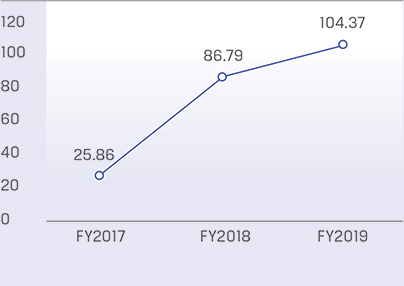
SPM (mg/NM3)
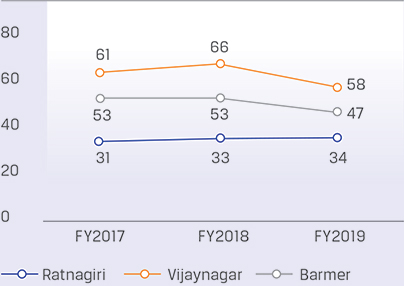
SOx (mg/NM3)
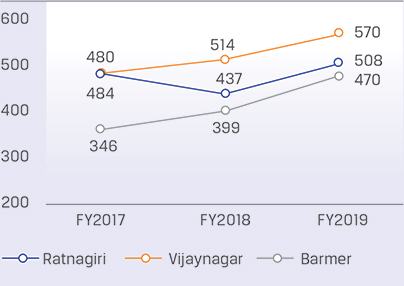
NOx (mg/NM3)
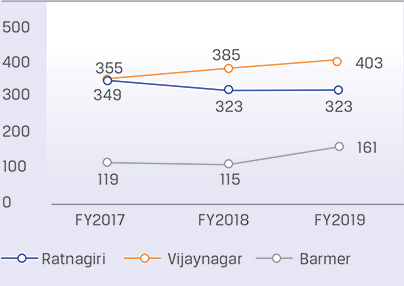
Specific GHG Emission (MTCO2e/MU)
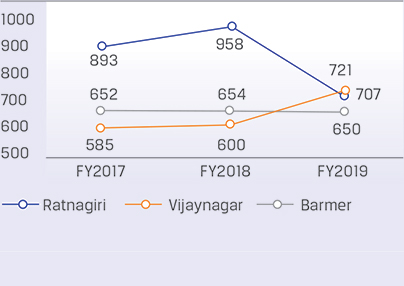
Water Consumption (million KL)
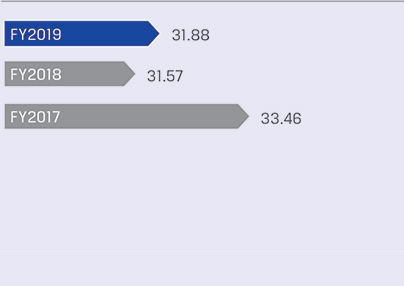
Waste generated at JSW Energy
Non-hazardous Waste (MT)
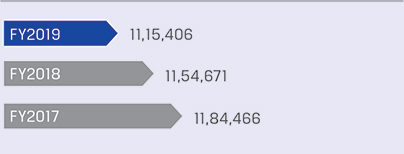
Hazardous Waste (MT)
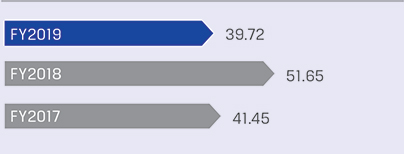
The following chart shows the quantum of wastewater that is treated in the last three years. However, our Ratnagiri plant uses a seawater cooling system, which results in zero consumption of natural river water. Therefore, the need to recycle is eliminated.
Waste Water Treated (KL)
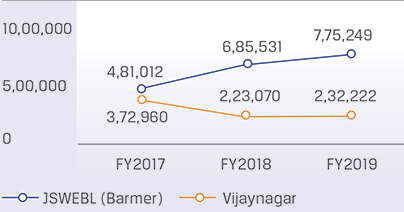
Recycling
During FY2019, we recycled 24.1% and 6.7% of the total wastewater at our JSWEBL and Vijayanagar plants, respectively.
We installed an effluent recycling plant to recycle water at the Vijayanagar plant. Seawater cooling systems were installed at Ratnagiri, resulting in zero consumption and no recycling requirement.
Energy Savings
Our energy saving has been increasing for the last three years. This reporting year, we recorded a 20% increase in our auxiliary energy savings.
LED lighting and heat pumps were installed to save electricity.
Continuous performance monitoring of our electrical equipment such as DG sets are undertaken to access energy utilisation.
GHG Emissions
GHG emissions at our Ratnagiri plant reduced from 893 MTCO2e/MU in FY2017 to 707 MTCO2e/MU in FY2019 whereas it increased for Vijayanagar plant from 585 MTCO2e/MU in FY2017 to 721 MTCO2e/MU in FY2019. We have real-time data connectivity to pollution board servers at our Vijayanagar plant. The environmental performance of the Vijayanagar plant is also displayed at the main gate.
Environmental Initiatives
At our JSWHEL plant, we installed LED lighting and heat pumps to save energy. We encourage the usage of by-product gas from the steel plant in power boilers to displace coal at our Vijayanagar plant.
We organise awareness campaigns through activities such as Environment Day Celebration and essay competitions that provide innovative ideas related to energy conservation and environment protection.
Certifications
Internal and external audits for our plants’ performance are undertaken at least thrice a year.
Besides all our plants being certified to ISO 140001, ISO 9001 and OHSAS 18001, our thermal power plants are also ISO 50001:2011 certified.
Towards Clean Energy
JSWHEL is a hydro-based plant, which is a renewable source of energy production. Both projects at JSWHEL are based on the run-of-river hydro scheme, with no large pond and no emission of GHG. This helps in the sustainable development and the projects are registered under Clean Development Mechanism (CDM). The JSWHEL plant has also undertaken the initiative to cover the available land around the plant sites and open spaces within the premises with green belts, which lead to improved micro-climate conditions.
